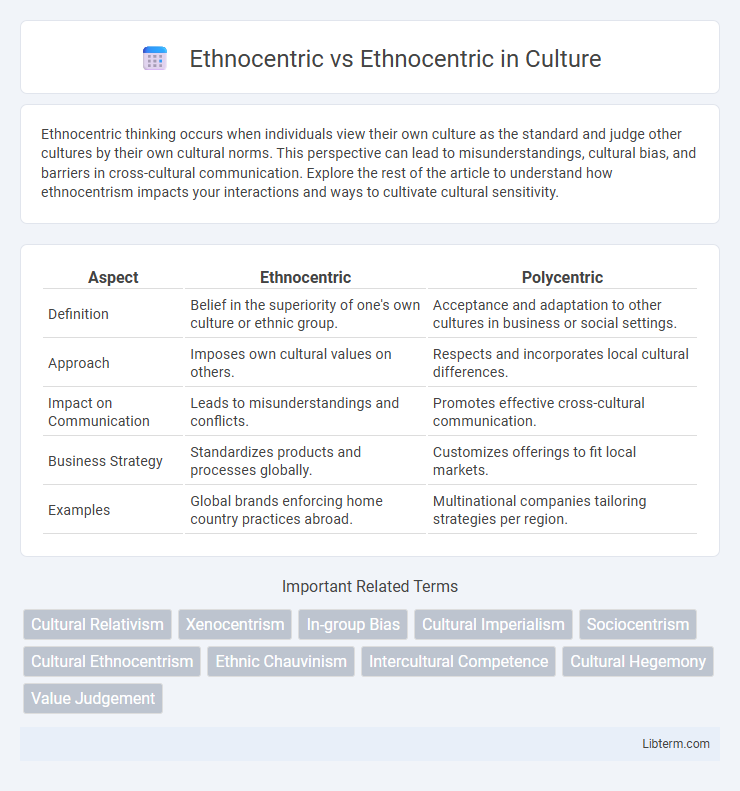Ethnocentric thinking occurs when individuals view their own culture as the standard and judge other cultures by their own cultural norms. This perspective can lead to misunderstandings, cultural bias, and barriers in cross-cultural communication. Explore the rest of the article to understand how ethnocentrism impacts your interactions and ways to cultivate cultural sensitivity.
Table of Comparison
| Aspect | Ethnocentric | Polycentric |
|---|---|---|
| Definition | Belief in the superiority of one's own culture or ethnic group. | Acceptance and adaptation to other cultures in business or social settings. |
| Approach | Imposes own cultural values on others. | Respects and incorporates local cultural differences. |
| Impact on Communication | Leads to misunderstandings and conflicts. | Promotes effective cross-cultural communication. |
| Business Strategy | Standardizes products and processes globally. | Customizes offerings to fit local markets. |
| Examples | Global brands enforcing home country practices abroad. | Multinational companies tailoring strategies per region. |
Understanding Ethnocentric Perspectives
Ethnocentric perspectives prioritize one's own cultural norms and values as the standard for interpreting behaviors and beliefs, often leading to misjudgment or undervaluation of other cultures. Recognizing ethnocentrism involves analyzing how cultural biases shape perceptions and potentially reinforce stereotypes. Understanding these viewpoints is crucial for fostering intercultural empathy, promoting diversity, and improving communication in global settings.
Ethnocentrism: Definition and Origins
Ethnocentrism refers to the belief that one's own culture or ethnic group is superior to others, often leading to biased judgments and social exclusion. Its origins trace back to early human societies where in-group loyalty and survival depended on identifying and favoring members of the same ethnic group. This cultural bias influences social interactions, intercultural communication, and can contribute to prejudice and discrimination in diverse societies.
The Psychology Behind Ethnocentric Views
Ethnocentric views stem from psychological mechanisms such as in-group favoritism and social identity theory, where individuals derive self-esteem from belonging to their cultural group. Cognitive biases like stereotyping and confirmation bias reinforce these views by simplifying complex social information into familiar categories. These psychological processes foster a sense of superiority and cultural bias that impact cross-cultural interactions and conflict resolution.
Ethnocentric vs Ethnocentric: Clarifying the Concept
Ethnocentric perspectives prioritize one's own culture as the central reference point, often leading to biased interpretations of other cultures. Clarifying the concept involves distinguishing ethnocentrism from cultural relativism, which advocates understanding cultures on their own terms without hierarchy. Recognizing ethnocentric biases is essential for fostering cross-cultural empathy and effective global communication.
Manifestations of Ethnocentrism in Society
Manifestations of ethnocentrism in society include cultural bias, social exclusion, and discriminatory practices that elevate one ethnic group's norms as superior to others. These behaviors often result in stereotyping, prejudice, and institutional inequalities, impacting social cohesion and intercultural communication. Recognizing ethnocentrism's influence in education, media, and policymaking is crucial to promoting inclusivity and diversity.
Positive and Negative Effects of Ethnocentrism
Ethnocentrism fosters strong cultural identity and social cohesion by promoting pride in one's own ethnic group, encouraging unity and belonging among members. However, it can lead to prejudice, discrimination, and social exclusion by diminishing the value of other cultures and fostering misunderstanding. This dual impact influences intercultural relations, often causing conflicts while simultaneously reinforcing group solidarity.
Ethnocentric Attitudes in Global Interactions
Ethnocentric attitudes in global interactions often lead to biased decision-making by favoring one's own cultural norms and values, which can create misunderstandings and hinder effective communication. These attitudes impact multinational organizations by shaping management styles, marketing strategies, and employee relations through cultural preferences that overlook local customs and practices. Mitigating ethnocentrism requires fostering cultural awareness and adopting ethnorelative approaches to promote inclusivity and enhance cross-cultural collaboration.
Overcoming Ethnocentric Biases
Overcoming ethnocentric biases requires fostering cultural awareness and empathy by encouraging individuals to appreciate diverse perspectives beyond their own cultural norms. Education and intercultural communication play critical roles in reducing prejudices by highlighting commonalities and cultivating mutual respect among different ethnic groups. Organizations that implement diversity training and inclusive policies can significantly minimize ethnocentrism, promoting collaboration and global understanding.
Ethnocentrism in Historical Context
Ethnocentrism in historical context refers to the tendency of societies or cultures to judge other groups based on the standards and values of their own ethnic background, often leading to biased interpretations of historical events. This perspective influenced colonial practices and justified domination by portraying non-Western cultures as inferior or primitive. Understanding ethnocentrism is crucial for re-evaluating historical narratives to foster cultural relativism and more accurate multidisciplinary analyses.
Promoting Cultural Awareness and Inclusivity
Ethnocentric perspectives prioritize one's own culture as superior, often leading to biased judgments and cultural misunderstandings that hinder effective communication. Promoting cultural awareness requires recognizing and valuing diverse cultural norms and practices without imposing one's own cultural standards. Emphasizing inclusivity fosters mutual respect, enhances intercultural dialogue, and supports equitable collaboration in increasingly multicultural environments.
Ethnocentric Infographic

 libterm.com
libterm.com